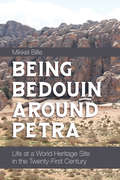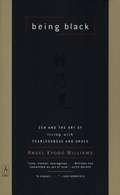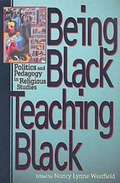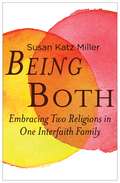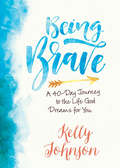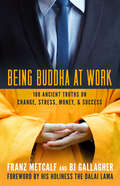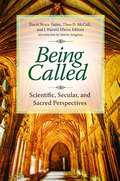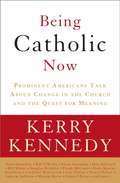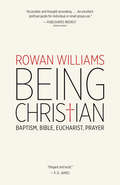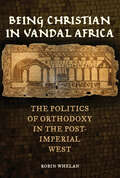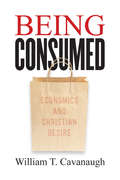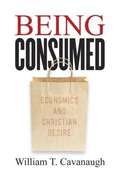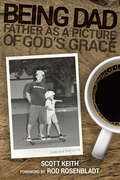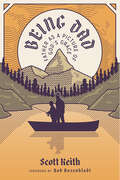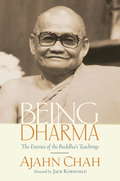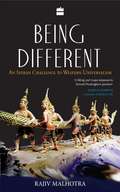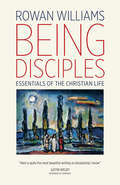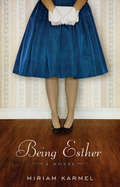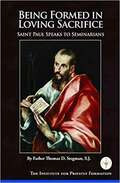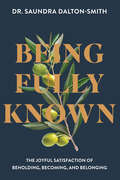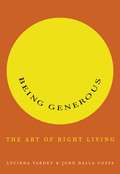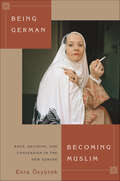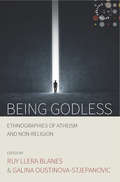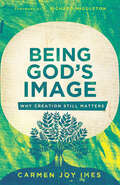- Table View
- List View
Being Bedouin Around Petra: Life at a World Heritage Site in the Twenty-First Century
by Mikkel BillePetra, Jordan became a UNESCO World Heritage site in 1985, and the semi-nomadic Bedouin inhabiting the area were resettled as a consequence. The Bedouin themselves paradoxically became UNESCO Masterpieces of Oral and Intangible Heritage in 2005 for the way in which their oral traditions and everyday lives relate to the landscape they no longer live in. Being Bedouin Around Petra asks: How could this happen? And what does it mean to be Bedouin when tourism, heritage protection, national discourse, an Islamic Revival and even New Age spiritualism lay competing claims to the past in the present?
Being Black
by Angel Kyodo WilliamsBeing Black has gained an enthusiastic following in African American and Zen communities. Angel Kyodo Williams shows black Americans how to develop a "warrior-spirit" of truth and responsibility that can lead to happiness and personal transformation. The principles and tools she offers provide a framework for addressing the African American community's unique worries, hopes, challenges, and expectations. Williams uses an eloquent, hip, and honest approach to share personal stories, time-tested teachings, and simple guidelines that invite readers of all faiths to discover how to step into the freedom of a life lived with fearlessness, grace, and fluidity.
Being Black Teaching Black: Politics and Pedagogy in Religious Studies
by Nancy Lynne Westfieldthe challenge of deep conversation
Being Both: Embracing Two Religions in One Interfaith Family
by Susan Katz MillerA book on the growing number of interfaith families raising children in two religions Susan Katz Miller grew up with a Jewish father and Christian mother, and was raised Jewish. Now in an interfaith marriage herself, she is a leader in the growing movement of families electing to raise children in both religions, rather than in one religion or the other (or without religion). Miller draws on original surveys and interviews with parents, students, teachers, and clergy, as well as on her own journey, in chronicling this grassroots movement. Being Both is a book for couples and families considering this pathway, and for the clergy and extended family who want to support them. Miller offers inspiration and reassurance for parents exploring the unique benefits and challenges of dual-faith education, and she rebuts many of the common myths about raising children with two faiths. Being Both heralds a new America of inevitable racial, ethnic, and religious intermarriage, and asks couples who choose both religions to celebrate this decision.
Being Brave: A 40-Day Journey to the Life God Dreams for You
by Kelly Johnson“For God gave us a spirit not of fear but of power and love and self-control.” (2 Timothy 1:7 ESV) God has made us brave, not fearful beings. In a forty-day devotional format, author and blogger Kelly Johnson invites you to consider a new way of thinking about what it means to be brave and challenges you to seek a greater intimacy with God and the people God has placed in your life. Through Scripture, stories, prayers, and thought-provoking questions, you will recognize the seeds of divinely inspired bravery and learn the strength found in community. Using letters of the word brave as a guide, Being Brave highlights what God’s Word has to say about the characteristics of bravery: Bold, Resilient, Authentic, Vulnerable, and Engaged and Empowered by the Spirit. Banish the fear that holds you back. You are a brave soldier!
Being Buddha at Work: 108 Ancient Truths on Change, Stress, Money, & Success
by Franz Metcalf Bj GallagherOffers ancient solutions to today's problems and provides new perspectives on timeless troubles For people seeking to bring spiritual values to work or seeking to discover new beliefs and values through their work Coauthored by Buddhist scholar Franz Metcalf and workplace expert BJ Gallagher Buddhism has for thousands of years provided a spiritual foundation for the daily lives of millions of people around the world. But does Buddhism have anything to offer us--Buddhists and non-Buddhists alike--in today's world of work? Metcalf and Gallagher think it does. Spiritual wisdom, Western or Eastern, inspires and instructs us in living a good life. And that's just as true at work as at home. Buddha mind--a source of calm, compassion, and insight--exists within each of us, not just the historical Buddha. Being Buddha at Work shows how to embody that mind in the stress and clamor of the workplace--how to tap into the Buddha consciousness so we can relieve daily tensions and greet challenges with awareness, equanimity, and good humor. The book is divided into three sections. The first, "Becoming a Mindful Worker," covers Buddha's wisdom for our own work; the second, "Cultivating Mindful Work Relationships," focuses on how to work with other people; the third, "Creating a Mindful Workplace," deals with broader organizational topics. There is wisdom here for everyone--from frontline workers and team members, to supervisors and managers, to top executives and organizational leaders.
Being Called: Scientific, Secular, and Sacred Perspectives
by Theo D. McCall J. Harold Ellens David Bryce YadenThis unique book is an essential resource for interdisciplinary research and scholarship on the phenomenon of feeling called to a life path or vocation at the interface of science and religion. Drawing upon the collective knowledge and insight of expert authors from Australia, China, Eastern Europe, Italy, the UK, and the United States, the work provides a comprehensive examination of the topic of callings suitable for collegiate students, professors, and professional scholars interested in topics at the interface of science and religion. It will also benefit general readers seeking the expertise of psychologists, neuroscientists, and theologians from various backgrounds and worldviews who explain why it is important to "do what you were meant to do."
Being Catholic Now: Prominent Americans Talk About Change in the Church and the Quest for Meaning
by Kerry KennedyFor Kerry Kennedy, who grew up in a devoutly Catholic household coping with great loss, her family’s faith was a constant source of strength and solace. As an adult, she came to question some of the attitudes and teachings of the Catholic Church while remaining an impassioned believer in its role as a defender of the poor and oppressed. “Generations ago,” says Kennedy, “the search for spirituality came predefined and prepackaged. [The Church] not only gave us all the answers, it even gave us the questions to ask. ” Now many of the old certainties are being reexamined. In an attempt to convey this sea change, Kennedy asked thirty-seven American Catholics to speak candidly about their own faith—whether lost, recovered, or deepened—and about their feelings regarding the way the Church hierarchy is moving forward. The voices included here range from respectful to reproachful and from appreciative to angry. Speaking their minds are businesspeople, actors and entertainers, educators, journalists, politicians, union leaders, nuns, priests—even a cardinal. Some love the Church; some feel intensely that the Church wronged them. All have an illuminating insight or perspective. Kerry Kennedy herself speaks of the joy of growing up as one of Robert and Ethel Kennedy’s eleven children, of the tragedies that eventually befell her family, and of how religion was deeply woven through good times and bad. Journalist Andrew Sullivan talks about reconciling his devout Catholicism with the Church’s condemnation of his identity as a gay man. TV newswoman Cokie Roberts recalls the nuns who taught her and “took girls seriously when nobody else did. ” Comedian Bill Maher declares, “I hate religion. It’s the worst thing in the world”—and goes on to defend his bold assertion. Writer Anna Quindlen depicts a common parental challenge: passing along traditions and values to a younger generation sometimes deaf to spiritual messages. Through these and many other voices that speak not only to Catholics but to all of us,Being Catholic Nowredefines an ancient institution in the most contemporary of terms. From Being Catholic Now “When my mom asked if I wanted to be a nun, I said I’d rather be a priest. . . . The nuns were always wonderful, but the power was with the priest. ” —Nancy Pelosi “There are aspects of studying the saints, with the candles, incense, and Latin Masses and some of the pageantry of the Church that, as an American historian, make me feel part of a larger wave of history. That it’s not a newfangled religion, which some people get great solace from. I feel that I’m connected to places. ” —Douglas Brinkley “Faith isn’t like picking courses off a menu. It’s a journey, and it’s a path. If your path and journey have been within one structure your entire life, then simply leaving isn’t an option. ” —Andrew Sullivan “Why stay Catholic? Because the hierarchy is not the Church. . . . We [the people of God] are the Church. They can’t take that away from us. ” —Cokie Roberts “I was told very early on by the nuns that I had an ‘overabundance of original sin. ’ I was a quiet kid, but I was curious. I asked the wrong questions. ” —Susan Sarandon “I don’t believe you can be authentically Catholic without being committed to the social doctrine of the Church. When I was in grammar school, we had these little boxes to help the poor. That was good, but that is half of it. The other half is to find out why there are so many poor people and how we can do so
Being Christian: Baptism, Bible, Eucharist, Prayer
by Rowan WilliamsIn this simple, beautifully written book Rowan Williams explores four essential components of the Christian life: baptism, Bible, Eucharist, and prayer. Despite huge differences in Christian thinking and practice both today and in past centuries, he says, these four basic elements have remained constant and indispensable for the majority of those who call themselves Christians.In accessible, pastoral terms Williams discusses the meaning and practice of baptism, the Bible, the Eucharist, and prayer, inviting readers to really think through the Christian faith and how to live it out. Questions for reflection and discussion at the end of each chapter help readers to dig deeper and apply Williams's insights to their own lives.
Being Christian in Vandal Africa: The Politics of Orthodoxy in the Post-Imperial West (Transformation of the Classical Heritage #59)
by Robin WhelanBeing Christian in Vandal Africa investigates conflicts over Christian orthodoxy in the Vandal kingdom, the successor to Roman rule in North Africa, ca. 439 to 533 c.e. Exploiting neglected texts, author Robin Whelan exposes a sophisticated culture of disputation between Nicene (“Catholic”) and Homoian (“Arian”) Christians and explores their rival claims to political and religious legitimacy. These contests—sometimes violent—are key to understanding the wider and much-debated issues of identity and state formation in the post-imperial West.
Being Consumed: Economics and Christian Desire
by William T. CavanaughShould Christians be for or against the free market? For or against globalization? How are we to live in a world of scarcity? William Cavanaugh uses Christian resources to incisively address basic economic matters -- the free market, consumer culture, globalization, and scarcity -- arguing that we should not just accept these as givens but should instead change the terms of the debate.Among other things, Cavanaugh discusses how God, in the Eucharist, forms us to consume and be consumed rightly. Examining pathologies of desire in contemporary "free market" economies, Being Consumed puts forth a positive and inspiring vision of how the body of Christ can engage in economic alternatives. At every turn, Cavanaugh illustrates his theological analysis with concrete examples of Christian economic practices.
Being Consumed: Economics and Christian Desire
by William T. CavanaughShould Christians be for or against the free market? For or against globalization? How are we to live in a world of scarcity? William Cavanaugh uses Christian resources to incisively address basic economic matters - the free market, consumer culture, globalization, and scarcity - arguing that we should not just accept these as givens but should instead change the terms of the debate. Among other things, Cavanaugh discusses how God, in the Eucharist, forms us to consume and be consumed rightly. Examining pathologies of desire in contemporary "free market" economies, Being Consumed puts forth a positive and inspiring vision of how the body of Christ can engage in economic alternatives. At every turn, Cavanaugh illustrates his theological analysis with concrete examples of Christian economic practices.
Being Dad: Father as a Picture of God's Grace
by Scott Leonard KeithThis book deals with the way fathers, and the subject of fatherhood, are treated in modern culture. Dr. Keith brings his experience with family, students, great mentors and friends to bear on this subject which is crying out for attention. Equally, he brings his Christian faith, a scholarly eye for detail and an ear for story along on the journey and works with the reader to navigate a path to a better country where the Father blesses His children and is honored.
Being Dad: Father As A Picture of God's Grace
by Scott Leonard Keith Rod RosenbladtEvery person is born with a deep longing for a father. Being Dad deals with the way fathers, and the subject of biblical fatherhood, are treated in modern culture. Dr. Keith brings his experience with family, students, great mentors, and friends to bear on a subject that is crying out for attention. Equally, he brings his Christian faith, a scholarly eye for detail, and an ear for story along on the journey and works with the reader to navigate a path to a better country where the Father blesses His children and is honored.Forgiven fathers are a gift from God, for they have the gospel to proclaim to their families. This approach leads to gracious fathers that can now display a shadow of the love of their Heavenly Father so that children may be drawn into saving faith.
Being Dharma: The Essence of the Buddha's Teachings
by Ajahn Chah Jack KornfieldChah offers a thorough exploration of Theravadan Buddhism in a gentle, sometimes humorous, style that makes the reader feel as though he or she is being entertained by a story. He emphasizes the path to freedom from emotional and psychological suffering and provides insight into the fact that taking ourselves seriously causes unnecessary hardship.Ajahn Chah influenced a generation of Western teachers: Jack Kornfield, Sharon Salzberg, Sylvia Boorstein, Joseph Goldstein, and many other Western Buddhist teachers were at one time his students. Anyone who has attended a retreat led by one of these teachers, or read one of their books, will be familiar with this master's name and reputation as one of the great Buddhist teachers of this century.
Being Different: An Indian Challenge to Western Universalism
by Rajiv MalhotraIn this book the author highlights that while unique historical revelations are the basis for Western religions, dharma emphasizes self-realization in the body here and now.
Being Disciples: Essentials of the Christian Life
by Rowan WilliamsBasic instruction in Christian discipleship from one of the world’s greatest living theologians “Discipleship,” says Rowan Williams in this companion to his best-selling Being Christian, “is a state of being. Discipleship is about how we live; not just the decisions we make, not just the things we believe, but a state of being.” Having covered baptism, Bible, Eucharist, and prayer in Being Christian, Williams turns his attention in this book to what is required for us to continue following Jesus and growing in faith. The book has six succinct chapters:Being DisciplesFaith, Hope, and LoveForgivenessHolinessFaith in SocietyLife in the Spirit In his typically gentle, inviting, pastoral writing style, Williams offers biblically grounded wisdom for Christians at all stages of their journeys as disciples of Jesus.
Being Esther: A Novel
by Miriam KarmelEightysomething Esther Lustig tells the story of her life in a witty, touching novel that “will linger long in readers’ minds and hearts” (Pioneer Press).“Widowed and in her mid-eighties, Esther checks in with her friend Lottie each morning to confirm that each has made it through the night. But there is no way that she’s going to surrender to her bossy daughter, Ceely, and move into an assisted living facility, which she disdainfully calls Bingoville. In her first novel, Karmel takes an understated and disarming approach to the closing years in the life of a seemingly ordinary woman, imbuing Esther with a subtle but zingy wit and underappreciated intelligence. Esther reflects on her mother’s frostiness and her mother-in-law’s ‘acid tongue,’ her own passion for books, the grinding disappointments and late-blooming joys of her marriage, and Ceely’s harrowing incommunicado years. Brimming with keen observations yet slow to articulate them due to her body’s strange new hesitations, Esther is appalled by how strangers treat her as an ‘object of concerned looks and condescension.’ Karmel’s novel of womanhood, the love and strife between mothers and daughters, marital dead zones, and the baffling metamorphosis of age is covertly complex, quietly incisive, and stunning in its emotional richness.” —Booklist “Being Esther is impossible to put down . . . a wonderful debut.” —Margot Livesey, author of The Flight of Gemma Hardy
Being Formed in Loving Service: St Paul Speaks to Seminarians
by Father Thomas D. Stegman S. J.In his book Being Formed in Loving Service: Saint Paul Speaks to Seminarians, Father Thomas D. Stegman, S.J. examines the areas of priestly formation (human, spiritual, intellectual, and pastoral) and illustrates how St. Paul, in his life and writings, represents each of these areas. Seminarians and their formators will find this book both helpful and inspirational.
Being Formed in Loving Service: St Paul Speaks to Seminarians
by Father Thomas D. Stegman S. J.In his book Being Formed in Loving Service: Saint Paul Speaks to Seminarians, Father Thomas D. Stegman, S.J. examines the areas of priestly formation (human, spiritual, intellectual, and pastoral) and illustrates how St. Paul, in his life and writings, represents each of these areas. Seminarians and their formators will find this book both helpful and inspirational.
Being Fully Known: The Joyful Satisfaction of Beholding, Becoming, and Belonging
by Dr. Saundra Dalton-SmithA weaving of biblical wisdom, keen insights into human behavior, and personal reflection prompts, Being Fully Known tackles the negative self-talk and limiting beliefs that leave us stuck in lives that are not our own. The world pressures us to do. God invites us to be. In this freeing book, Dr. Saundra Dalton-Smith speaks to all of us who hold back because we fear vulnerability or rejection. Using her background as a physician, spiritual mentor, and coach, Dr. Saundra helps us bridge the disconnect between the wanting to express our true selves and the beliefs that keep us in fear-based living. Structured with the option to be used as part of a 21-day fast, Being Fully Known blends Scripture, science, and story to offer insights into how we can: discover where we naturally fit rather than forcing ourselves to fit in embrace the fullness of our identity apart from our assumed roles overcome mental barriers that cause us to seek accomplishment over contentment reconnect with the courage to live into what God sees in us experience greater joy in our relationships, career, and creative expression Being Fully Known is a journey toward God-awareness, self-acceptance, and the fulfillment found in knowing we are seen and understood. Step into your God-given, joy-filled identity as you follow the mentoring of the Holy Spirit through this life-changing guide to being over doing.
Being Generous: The Art of Right Living
by Lucinda Vardey John Dalla CostaThis extraordinary little book has the power to heal and foster relationships, console and empower individuals, create community and help save the world by providing a spiritual ecology for our daily lives.Think that's a bold claim? It is, but it's also true. We can all be generous with our money when an occasion like Christmas rolls around, or when disaster strikes as it did with the Boxing Day tsunami of 2004. But Lucinda Vardey and John Dalla Costa say that this kind of giving segregates generosity, and makes it a special activity only for special times. If we're truly going to help this troubled world, as individuals we must investigate other possibilities for being generous as well, by helping those we interact with every day: our children, colleagues, parents, friends and the homeless men and women we encounter when out and about in our cities. We learn that the four most generous words in the English language are "I'm sorry" and "Thank you." We learn that if we ask, "What do you need?" we may be surprised how readily we can provide assistance, and how a single generous act may turn into something that circulates to include many.Lucinda and John are a married couple who have committed-they say "humbly and imperfectly"-to making generosity a central practice in their daily lives. What they refer to as their art of right living, within family, work and community, is both a mode of being and a value that infiltrates all others. Generosity inspires and guides them, and continually tests and teaches them. This book is filled with true stories they've collected about generosity in action. Being Generous is their gift to readers, written to enable and encourage us to follow the generous way.She was famous for her work with the poor in the streets of Calcutta. One day a beggar by the road ran up to her with a small coin-financially worthless to anyone but him. It was his day's take on a long, hot and humid day, and he wanted to give it to her. She pondered what to do. If she took the money then he would have nothing at all, but if she rejected him, it would not only hurt him but insult his generosity. She stretched out her hand-he, who never had the chance to give, could give to Mother Teresa. The joy on his face said everything to her.The Lesson: Saying no to another's offer denies them the joy of giving. Accepting what they wish to give-even if you don't need it-is what practising true generosity is about.--from Being GenerousFrom the Hardcover edition.
Being German, Becoming Muslim: Race, Religion, and Conversion in the New Europe (Princeton Studies in Muslim Politics #56)
by Esra ÖzyürekEvery year more and more Europeans, including Germans, are embracing Islam. It is estimated that there are now up to one hundred thousand German converts—a number similar to that in France and the United Kingdom. What stands out about recent conversions is that they take place at a time when Islam is increasingly seen as contrary to European values. Being German, Becoming Muslim explores how Germans come to Islam within this antagonistic climate, how they manage to balance their love for Islam with their society's fear of it, how they relate to immigrant Muslims, and how they shape debates about race, religion, and belonging in today’s Europe.Esra Özyürek looks at how mainstream society marginalizes converts and questions their national loyalties. In turn, converts try to disassociate themselves from migrants of Muslim-majority countries and promote a denationalized Islam untainted by Turkish or Arab traditions. Some German Muslims believe that once cleansed of these accretions, the Islam that surfaces fits in well with German values and lifestyle. Others even argue that being a German Muslim is wholly compatible with the older values of the German Enlightenment.Being German, Becoming Muslim provides a fresh window into the connections and tensions stemming from a growing religious phenomenon in Germany and beyond.
Being Godless: Ethnographies of Atheism and Non-Religion (Studies in Social Analysis #1)
by Galina Oustinova-Stjepanovic Roy Llera BlanesDrawing on ethnographic inquiry and the anthropological literature on doubt and atheism, this volume explores people's reluctance to pursue religion. The contributors capture the experiences of godless people and examine their perspectives on the role of religion in their personal and public lives. In doing so, the volume contributes to a critical understanding of the processes of disengagement from religion and reveals the challenges and paradoxes that godless people face.
Being God's Image: Why Creation Still Matters
by Carmen Joy ImesWhat does it mean to be human? This timeless question proves critical as we seek to understand our purpose, identity, and significance. Amidst the many voices clamoring to shape our understanding of humanity, the Bible reveals important truths related to our human identity and vocation that are critical to the flourishing of all of creation. Carmen Joy Imes seeks to recover the theologically rich message of the creation narratives starting in the book of Genesis as they illuminate what it means to be human. Every human being is created as God’s image. Imago Dei is our human identity, and God appointed humans to rule on God's behalf. Being God’s Image explores the implications of this kinship relationship with God and considers what it means for our work, our gender relations, our care for creation, and our eternal destiny. The Bible invites us into a dramatically different quality of life: a beloved community in which we can know God and one another as we are truly known. Includes a discussion guide for personal reflection or group study, as well as links to related video material through the BibleProject.
